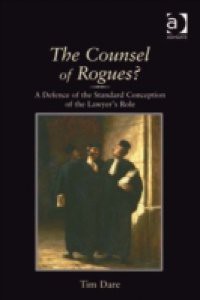There is a widespread perception that even when lawyers are acting squarely within their roles, being good lawyers, they display the vices of dishonesty and deviousness. At the heart of the perception is the so called standard conception of the lawyers role according to which lawyers owe special duties to their clients which render permissible, or even mandatory, acts that would otherwise count as morally impermissible. Many have concluded that the standard conception should be set aside. This book suggests that the moral implications of the standard conception are often mischaracterised. Critics suggest that the conception requires lawyers to secure any advantage the law can be made to give. But Dare offers a moral argument for the conception, according to which it justifies a more limited and moderate sphere of professional conduct than is normally supposed, allowing lawyers to preserve their integrity while giving proper weight to the role-differentiated permissions and obligations of their roles.

